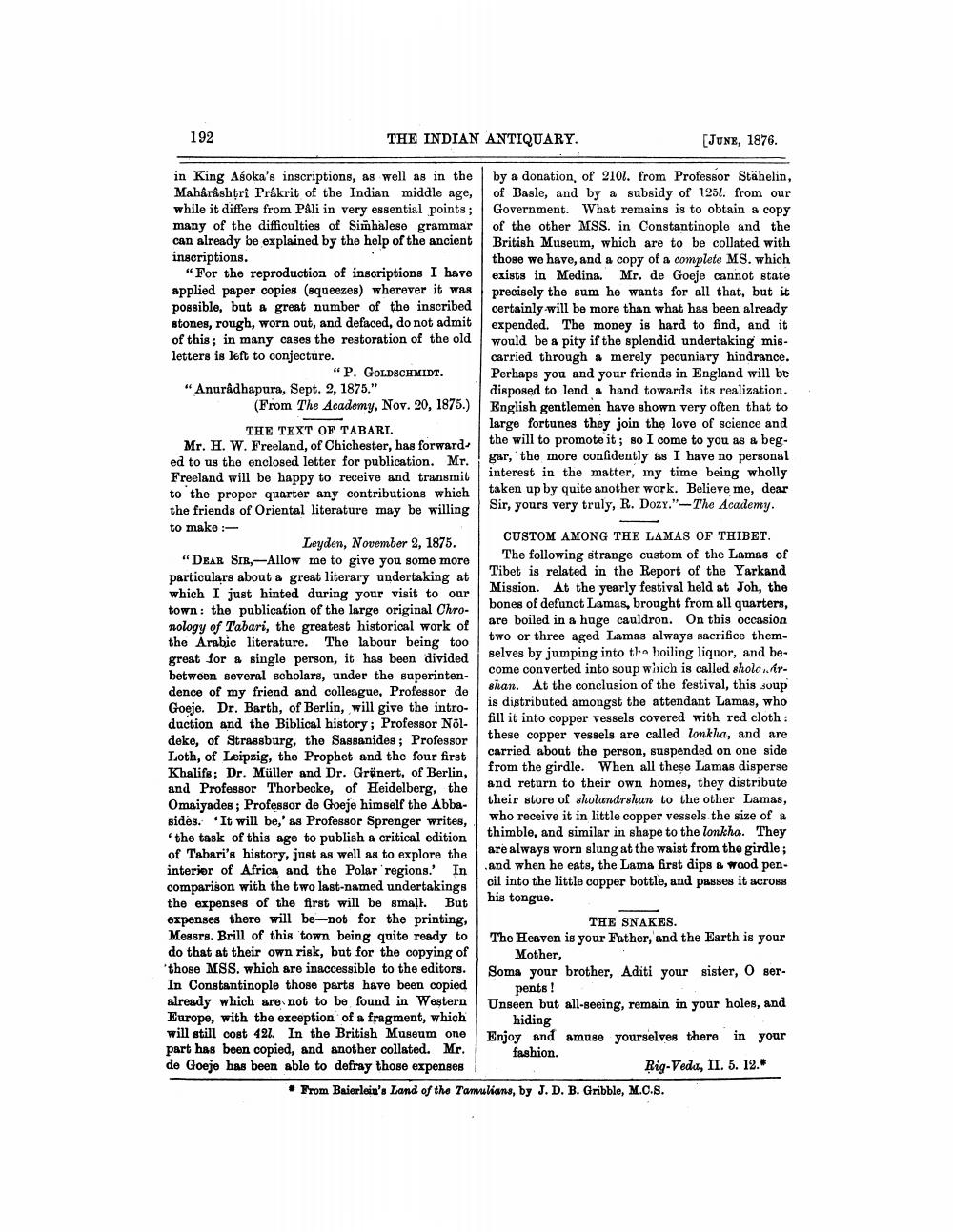________________
192
THE INDIAN ANTIQUARY.
[JUNE, 1876.
by a donation, of 2101. from Professor Stähelin, of Basle, and by a subsidy of 1251. from our Government. What remains is to obtain a copy of the other MSS. in Constantinople and the British Museum, which are to be collated with those we have, and a copy of a complete MS. which exists in Medina. Mr. de Goeje cannot state precisely the sum he wants for all that, but it certainly will be more than what has been already expended. The money is hard to find, and it would be a pity if the splendid undertaking miscarried through a merely pecuniary hindrance. Perhaps you and your friends in England will be disposed to lend a hand towards its realization.
(From The Academy, Nov. 20, 1875.) English gentlemen have shown very often that to
large fortunes they join the love of science and the will to promote it; so I come to you as a beggar, the more confidently as I have no personal interest in the matter, my time being wholly taken up by quite another work. Believe me, dear Sir, yours very truly, R. Dozy."-The Academy.
in King Aśoka's inscriptions, as well as in the Mahârâshtri Pråkrit of the Indian middle age, while it differs from Pâli in very essential points; many of the difficulties of Simhalese grammar can already be explained by the help of the ancient inscriptions.
"For the reproduction of inscriptions I have applied paper copies (squeezes) wherever it was possible, but a great number of the inscribed stones, rough, worn out, and defaced, do not admit of this; in many cases the restoration of the old letters is left to conjecture.
"P. GOLDSCHMIDT.
"Anuradhapura, Sept. 2, 1875."
THE TEXT OF TABARI.
Mr. H. W. Freeland, of Chichester, has forwarded to us the enclosed letter for publication. Mr. Freeland will be happy to receive and transmit to the proper quarter any contributions which the friends of Oriental literature may be willing
to make :
Leyden, November 2, 1875.
"DEAR SIR,-Allow me to give you some more particulars about a great literary undertaking at which I just hinted during your visit to our town: the publication of the large original Chronology of Tabari, the greatest historical work of the Arabic literature. The labour being too great for a single person, it has been divided between several scholars, under the superintendence of my friend and colleague, Professor de Goeje. Dr. Barth, of Berlin, will give the introduction and the Biblical history; Professor Nöldeke, of Strassburg, the Sassanides; Professor Loth, of Leipzig, the Prophet and the four first Khalifa; Dr. Müller and Dr. Grünert, of Berlin,
and Professor Thorbecke, of Heidelberg, the Omaiyades; Professor de Goeje himself the Abbasides. It will be,' as Professor Sprenger writes, 'the task of this age to publish a critical edition of Tabari's history, just as well as to explore the interior of Africa and the Polar regions.' In comparison with the two last-named undertakings the expenses of the first will be small. But expenses there will be-not for the printing, Messrs. Brill of this town being quite ready to do that at their own risk, but for the copying of 'those MSS. which are inaccessible to the editors. In Constantinople those parts have been copied already which are not to be found in Western Europe, with the exception of a fragment, which will still cost 427. In the British Museum one part has been copied, and another collated. Mr. de Goeje has been able to defray those expenses
CUSTOM AMONG THE LAMAS OF THIBET. The following strange custom of the Lamas of Tibet is related in the Report of the Yarkand Mission. At the yearly festival held at Joh, the bones of defunct Lamas, brought from all quarters, are boiled in a huge cauldron. On this occasion two or three aged Lamas always sacrifice themselves by jumping into the boiling liquor, and become converted into soup which is called sholo..árshan. At the conclusion of the festival, this soup is distributed amongst the attendant Lamas, who fill it into copper vessels covered with red cloth: these copper vessels are called lonkha, and are carried about the person, suspended on one side from the girdle. When all these Lamas disperse and return to their own homes, they distribute
their store of sholanárshan to the other Lamas, who receive it in little copper vessels the size of a thimble, and similar in shape to the lonkha. They are always worn slung at the waist from the girdle; and when he eats, the Lama first dips a wood penoil into the little copper bottle, and passes it across his tongue.
THE SNAKES. The Heaven is your Father, and the Earth is your Mother,
Soma your brother, Aditi your sister, O serpents! Unseen but all-seeing, remain in your holes, and
hiding Enjoy and amuse yourselves there in your Big-Veda, II. 5. 12.*
fashion.
• From Baierlein's Land of the Tamulians, by J. D. B. Gribble, M.C.S.




